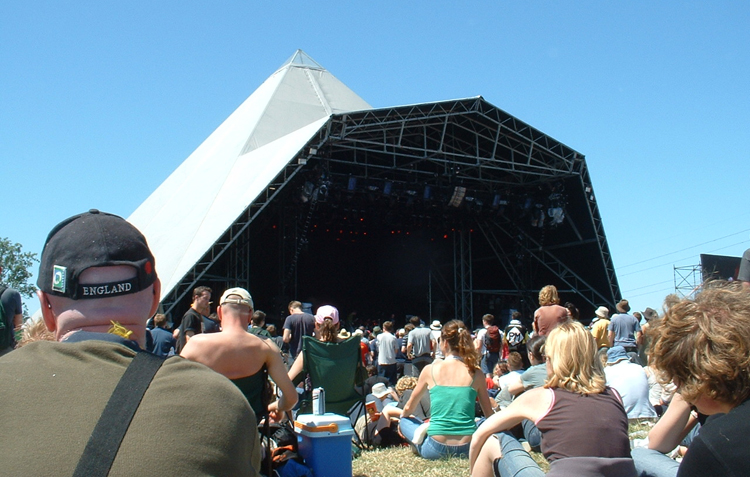
The head of production at Glastonbury has written a few sentences about how wind affects the sound at the Pyramid stage. Weather has caused serious problems with sound at past Festivals. At the Reading Festival in 2008 atmospheric conditions caused complaints that headline acts Rage Against The Machine and The Killers were too quiet. Why?
Temperature and wind
Problems arise when sound from the stage is unexpectantly loud outside the festival venue at neighbouring houses. Normally sound radiating from the loudspeakers going upwards into the atmosphere is lost forever and does not cause problems to neighbours. But some weather conditions cause the sound which is initially going upwards to bend downwards (by refraction). This can create conditions where outside the venue the Festival is exceeding noise levels set by local Councils, while nearer the stage things are too quiet. Festivals might be forced to turn down the volume.

The cause of the refraction is that the speed of sound can vary with height. When a layer of cold air close to the ground is trapped below hotter air above, then the speed of sound increases with height. This causes the downward refraction of sound. This happens with temperature inversions which normally happen on calm days with clear skies early in the morning.
Sound engineer Bruce Main says that in extreme cases: “sound waves can actually bounce off the ground and skip over part of the audience before refracting downward again further on, causing dead spots in the system coverage.”
Wind can also create similar effects by causing subtle changes in the speed of sound, causing sound from the stacks to bend in different directions depending on how the wind changes. Crosswinds can cause the sound to bend to the left and right. The wind isn’t pushing the sound directly, it is bending the sound via refraction.
Friday rain
The rain at Glastonbury on Friday had less effect on the sound than you might think. Rain means the atmosphere is more humid which means high frequencies will travel further. (Lower humidity creates more absorption.) So sound engineers need to rebalance the sound as the humidity changes, altering the mix between bass and treble.
Saturday
A warm, fine day with a moderate breeze is forcast. The weather shouldn’t be causing too many problems for the sound engineer today.
Experiment
Can’t get to Glastonbury and want a break from BBC’s coverage, try our YouTube experiment using clips from past Festivals: QualiTube.
Photo credits
- Glastonbury Festival, Wilco on the Pyramid Stage, by Joe D.
- Country_cottage_Essen-Vinckers_Blaricum_NL.jpg
0 responses to “How weather affects sound at Glastonbury”
Hi Trevor,
The inversion can often happen at night as well in the summer.
The wind also has an effect because the wind near the ground is slowed down by it. As the wind speed add or subtracts from the effective speed of sound you get refraction upwards away from the audience, for the wind blowing towards the stage, and refraction downwards towards the audience for the wind blowing away from the stage.
Add interference from different wind conditions and wind eddies (you can hear this if you listen to distant sounds as they rise and fall in volume, and you have a nightmare for the sound engineers in blustery wind too!
Jamie
[…] http://acousticengineering.wordpress.com/2013/06/29/how-weather-affects-sound-at-glastonbury/ […]